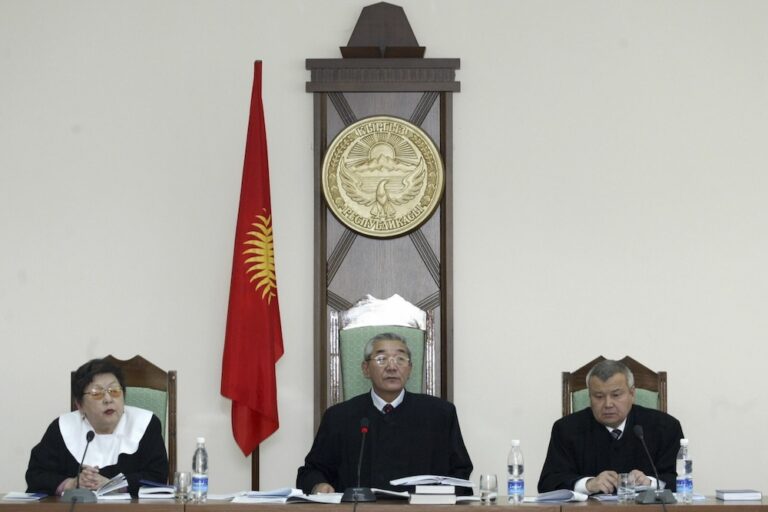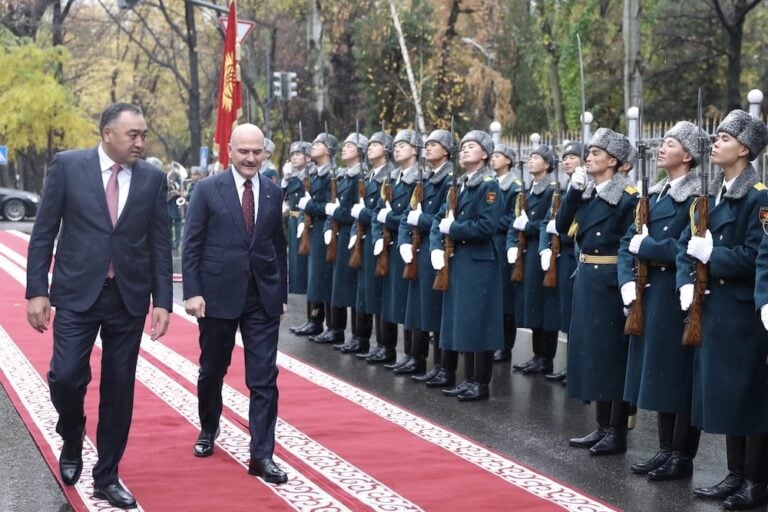On 16 April, the Kyrgyz parliament approved amendments to the criminal code imposing a custodial sentence for "spreading false information relating to a crime or offence" in the media at their second and third readings
On 16 April, the Kyrgyz parliament approved amendments to the criminal code imposing a custodial sentence for “spreading false information relating to a crime or offence” in the media at their second and third readings. In order to reduce the risk of abuses as a result of these new provisions, members also proposed a stricter framework for legal proceedings. Reporters Without Borders nonetheless deplores this unnecessary piece of legislation that endangers freedom of information.
“Current legislation already penalizes defamation and ‘false accusations’,” said Johann Bihr, the head of the press freedom organization’s Eastern Europe and Central Asia desk. “The adoption of the new law is a pointless backward step unworthy of the democratic ambitions professed by the Kyrgyz government.
“It makes nonsense of the decriminalisation of defamation in 2011. By once again turning a media-related offence into a crime, the authorities are sending a deterrent message to all journalists, promoting self-censorship and hindering investigative reporting. Despite the desire to create a stricter framework for legal proceedings that accompanied the amendments, the disproportionate penalties it imposes and the vagueness of the term “false information” turn it into a useful weapon for the censors.
“We call on President Almazbek Atambayev to acknowledge that this bill is contrary to the constitution and not to enact it.”
In the event of “false information” about an offence or a crime, the amendments approved on 16 April provide for penalties of between 50,000 and 200,000 Kyrgyz som (approximately 650 and 2,700 euros) and from one year to three years’ imprisonment depending on the seriousness of the falsehood.
The bill was sponsored by Eristina Kochkarova, an MP of the Ar-Namys party, among others. She had previously been wrongly accused of being a foreign national and she said she was motivated by the “need to counter the smear campaigns and mud-slinging of some news organizations”. In contrast to the previous bill sponsored by Galina Skripkina of the ruling party that was rejected by Parliament, Kochkarova stressed that the amendments were not only aimed at journalists but also at anyone responsible for spreading false information in the media, whether they were officials or ordinary citizens. However, news organizations fear they may be held criminally responsible for information they quote if they use unidentified sources.
Of the 85 members of Parliament, only seven voted against the bill. One of them was Shirin Aitmatova, the daughter of the renowned writer Chingiz Aitmatov. The day after the bill was passed, Omurbek Abdurakhmanov, supported by 15 other members, demanded that it be resubmitted to a vote.
Many civil society campaigners raised their voices against the amendments. The ombudsman Bakytbek Amanbaev also declared them to be unconstitutional, saying they violated parts of the Basic Law on free expression and free access to information: “Everyone has the right to seek, receive and disseminate information of any kind, unless it is contrary to the current constitutional system or other restrictions as defined by law”. If President Atambayev does not prevent the enactment of the amendments, the ombudsman has said he will appeal to the constitutional chamber of the Supreme Court.
Kyrgyzstan is an exception in Central Asia, marked as it is by despotic and authoritarian governments. It is ranked 97th of 180 countries in the 2014 World Press Freedom Index compiled by Reporters Without Borders. This position could change, however, in the light of recent parliamentary initiatives. Besides the amendments on false information, a bill aimed at banning “homosexual propaganda” was introduced in the Parliament on 15 April. Couched in similar terms to a law enacted in Russia in June last year, it provides for the penalization of, among other things, “the publication of photos, videos or information that implicitly or explicitly encourage non-traditional sexual relations such as homosexuality”.


